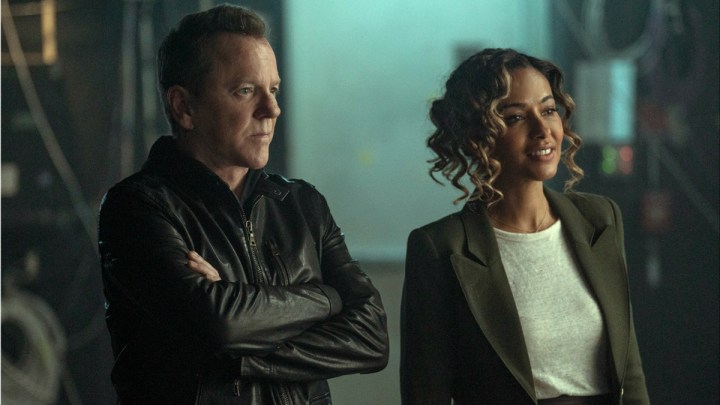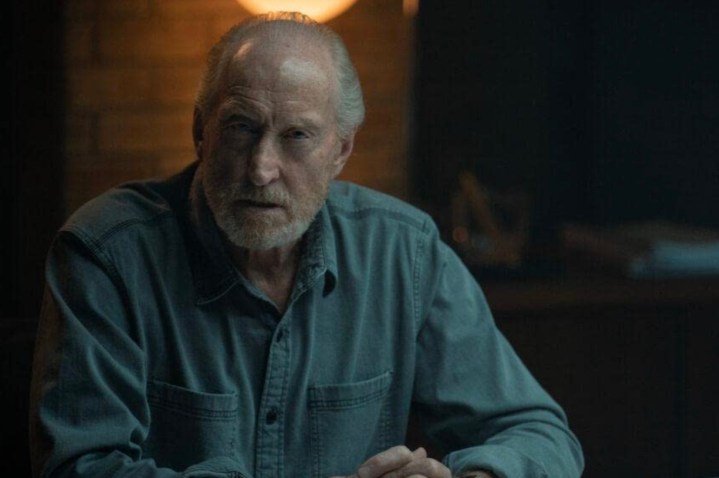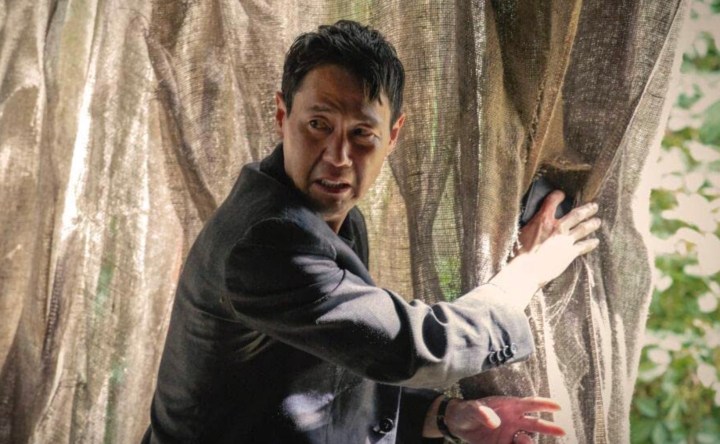For John Weir (The Contractor’s Kiefer Sutherland), deception is a strength, not a weakness. Weir specializes in corporate espionage, as he and his team manipulate stocks, create fake news stories, and make the lives of the rich a living nightmare for the group’s financial gain. Unlike the intense Jack Bauer on 24 and the noble Tom Kirkman on Designated Survivor, Sutherland’s Weir in Rabbit Hole is cocky, slick, and brilliant as he stays ten steps ahead of his opponents.
When he’s suddenly accused of murders he didn’t commit, Weir goes on the run and uses a team of unlikely allies to prove his innocence and search for the truth. Aside from Sutherland, the ensemble features Charles Dance (Game of Thrones), Meta Golding (Empire), Enid Graham (Mare of Easttown), Walt Klink (Arctic Circle), and Rob Yang (The Menu). Created by John Requa and Glenn Ficarra (This Is Us), Rabbit Hole is an espionage thriller that spotlights the power of disinformation and its ability to control the population.
In an interview with Digital Trends, the cast and creators of Rabbit Hole discuss the appeal of challenging roles and explain why a series about the power of technology and disinformation should be told in 2023.

Note: This interview has been edited for length and clarity.
Digital Trends: John, why create this type of show now?
John Requa: Well, I think those ’70s espionage thrillers were a product of the post-Watergate era, post-Vietnam, where people were feeling that the sacred institutions they had grown up with were unreliable. We just felt like, “Well, jeez. That is the time we’re in now and more so.” It’s time to tell these kinds of stories again.
I just think people feel like there are things behind the scenes happening that are out of their control by bad-intentioned, powerful people. We enter into the world with Kiefer’s character, who’s in corporate espionage [and] sort of a participant in it, but then he gets caught in a web of lies and death and destruction that makes him realize it’s a much more complicated and deadly game than he even he thought it was.
Rabbit Hole is a series full of many twists and turns. Besides the exciting premise, what else drew you to the project?
Meta Golding: The character was pretty twisty, so it’s always great to play a multi-layered character. Also, I liked the show’s central themes. Right now, we’re living in such a data-driven world yet at the same time, conspiracy theories are more popular than ever. In addition, the fact that Kiefer Sutherland was in it was a major draw.
Walt Klink: The character. It was just the character. I read the character. I just knew that it was something that I wanted. And then I had to audition, of course [laughs]. I’m not like these guys who’ve been doing this for a long time.
Rob Yang: I’m not that old, man. Come on, man [laughs]. He’s [Walt] always flaunting that “I’m so young.”

A common theme is these characters are more than meets the eye. They’re all hiding secrets, especially your character, Charles. How did you approach this character where the audience learns more about him as it goes along?
Charles Dance: With trepidation because you learn more about him as you go along, not just as an audience, but as an actor. John and Glenn have a particular way of writing. They write very, very well. That’s the initial attraction for the piece, but they’re very partial with their information. They kind of drip-feed you. I’ll ask a question, and they’ll give me the smallest answer that they can get away with. It keeps you on your toes as an actor, which is not a bad thing.
Agent Madi is Weir’s biggest adversary. How did you see the relationship between Agent Madi and Weir?
Enid Graham: I think she finds a kindred spirit with Weir because she is very driven, kind of obsessive, and won’t ever take “no” for an answer. He also has those qualities, so she becomes obsessed with exposing him, [and] bringing him down. It’s also important to her to regain her former position at the FBI. She sees this case as a way to do that, to prove herself in this man’s world where she’s struggling to be taken seriously and listened to. As a result, they’re really good sparring partners. They really clash against each other, and I think have mutual respect for each for the similarities that they share.
Glenn, when you were developing the show and working on the scripts, was there a moment where you said, “You know who be good for Weir? Kiefer Sutherland.”
Glenn Ficarra: Actually, we said that before we even wrote it [laughs]. I think we share a television agent who said he [Kiefer] was looking for something. We had just been toying with an idea right then and said, “Oh, you know this would be perfect for him because it sort of plays off of his persona.” We kind of dove in. We wrote the first script and then gave it to him, and we were off to the races.
I read an interesting quote that you said about Kiefer’s character. “He is not out to fool the audience, but the way the storytelling works, he’s a guy who could fool the audience.” Can you further elaborate on what you meant by that?
Ficarra: Well, the idea is that he plays a character who’s a little unreliable because he has a lot of secret knowledge. He knows a lot of what’s going on. Also, the filmmaking is revealing things at key moments, so you’re not getting the whole story. If the audience is going to be tricked in that way or toyed with, there’s no better person than someone like Kiefer, who America trusts. He’s an icon. The fine acting aside, you want someone that the audience is going to stay with, even when he’s not giving you the whole picture.
Your character, Hailey, starts as one thing and ends up entirely different, especially when you start to spar with Kiefer’s character a lot more. Meta, how were those scenes working alongside Kiefer?
Golding: Oh, they were so fun. I’ve said this so many times today, but it’s like playing a really great tennis match. He’s super intense. You throw the ball, and he throws it back even harder. We had so much fun. I felt like we would always laugh and say we fight really good. We’re good at fighting with each other, so it was great. Obviously, he’s an icon of film and television and knows what he’s doing. It was really fantastic.
What’s the secret to pulling off a successful plot twist? Because you’ve done that a lot in your projects.
Requa: There are a lot of tools that, as a writer and filmmaker, you can use, but it’s basically about trying to make the audience feel like you’re headed in a specific direction, and then don’t go there. Yeah, that’s about it [laughs].
Ficarra: We all recognize patterns and certain tools that filmmakers use to take you places. So you use those, and then just as everyone is starting to roll their eyes and go, “I know exactly what’s going to happen,” that’s when you pull off the twist.

Aside from being an entertaining series, Rabbit Hole is about disinformation and the idea of questioning reality. Is this an important story to tell in 2023?
Rob Yang: Yeah, I think so. A lot of the lies are bold-faced. There’s a lot of real-time gaslighting going on. Information and what is considered truth, it’s gotten really loosely defined. This show deals with deception and being manipulated, [and] it’s so relevant. But you can take what you want. It’s entertaining and you can enjoy it, or you can go down your own personal rabbit hole, close the blinds, and turn the lights off.
Dance: Yeah, I think it’s a very important story to tell. For anybody who is not aware of how one’s personal information is used, having watched this, hopefully, they will be made aware because it’s something we should be thinking about all the time. We’ve made such huge advances, but we haven’t really learned the law of cause and effect properly. Where we’re capable of doing the most extraordinary things, but it’s only now, we’re beginning to think, “Well, yeah. We can do it, but should we?”
The first two episodes of Rabbit Hole stream on March 26 on Paramount+. The remaining episodes will release weekly on Sundays.



